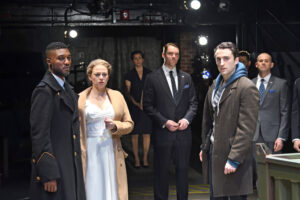by Kerry Torpey on March 2, 2018
Arts & Entertainment

by Kerry Torpey ’20
A&E Co-Editor
The words of legendary playwright William Shakespeare continue to influence the world of theatre with directors modernizing his works to reach contemporary audiences. Although Trinity Repertory Theater’s production of Othello offer a visually contemporary update, it stays true to themes of envy, love, and betrayal, while highlighting issues of gender and race still present today.
Othello is a Shakespearian tragedy that follows the downfall of the titular military general, played by Jude Sandy, as he is deceived and betrayed by the villainous Iago (Stephen Thorne), who is upset Othello promoted Cassio (Charlie Thurston) to lieutenant and not him. Othello struggles to withstand the manipulation, which ultimately destroys his marriage and wife, Desdemona (Rebecca Gibel).
Director Whitney White received her MFA in acting from Brown/Trinity Rep and has starred in Trinity Rep’s productions of Oliver and A Christmas Carol. On Feb. 12, she visited Providence College to speak at Dr. Dana Dillon and Dr. Jennifer Illuzzi’s DWC colloquium Race, Marginality, and Theologies of Liberation about her production of Othello.
Describing many elements of the show as “trippy,” White discussed her process in modernizing Shakespeare’s great tragedy. For example, she chose to dress the soldiers and generals in the play in U.S. military attire. This not only brings the text into a modern political context, but also one that addresses of culture of aggressive masculinity.
A scene in which the effects of toxic masculinity plays a significant role is when Iago plots to get Cassio drunk in order to ruin his reputation. The actors drink from a mixed bucket of various alcohols and funnel drinks down Cassio’s throat. They also manifest stereotypes as they wear shirts that refer to tweeting and Bud Light. A subsequent fight reveals the harmful effects enforced masculinity has on men.
A standout scene which White explained as one her of favorites to direct is when the three women of the play sing “A Willow Song.” She explained that working with Gibel, Angela Brazil (Emilia), and L’Oreal Lampley (Bianca) was a great experience that highlighted the importance of female relationships.
Often referred to as “the Moor,” Othello experiences a significant amount of race-related comments and issues. Most notably are those from Iago and Desdemona’s father, Brabantio (Brian McEleney). Despite being an army general and having authority over his comrades, Othello still experiences racism at the hands of his soldiers, which brings into question the influence of race in military affairs.
When asked about his character, Sandy explained that Othello, despite embracing “codes of warrior conduct,” is “an outsider, a social aberration who is reminded at every turn of his otherness, with almost no one he can truly trust to guide him” through Venetian life. For his role, he was most interested in exploring, “the price that other-ed persons of all kinds pay for success in the face of ostracism, how precarious that well-being can be, how easily it can fall apart.”
A play of complicated race and gender dynamics, Othello remains relevant for a society in the midst of a tense social and political climate. Trinity Rep’s production of Othello will continue its run until March 18. For more information on tickets and show times, visit www.trinityrep.com/show/othello.